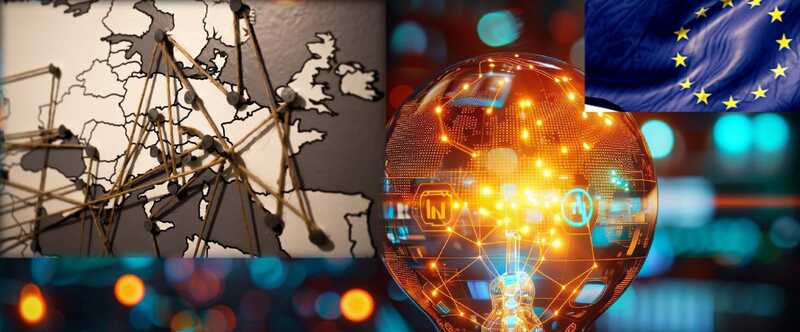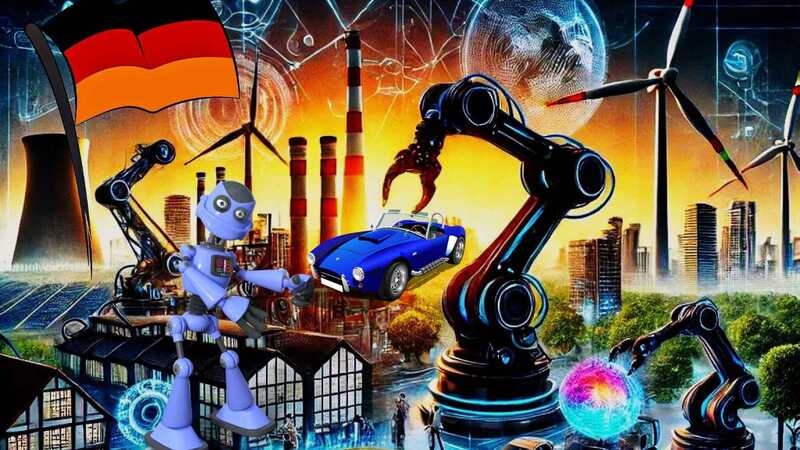
Europe's Tech Revolution: From Historical Breakthroughs To Modern Innovation With Sustainable Tech Solutions
Europe
Innovation
Europe is a global leader in innovation and technology, driving economic growth and sustainability. The region has a rich history of scientific advancements and continues to push boundaries in various fields. From cutting-edge research to thriving startups, Europe remains at the forefront of technological progress. In the past, Europe has shaped the path for technological and innovation breakthroughs. Classic breakthroughs by Europe; the printing press (Germany, 15th century) by Johannes Gutenberg, the steam engine by James Watt (UK, 18th century), electricity and electric light (18th – 19th) century by Michael Faraday and Thomas Edinson, Telegraph (19th century) by Samuel Morse and Graham Bell, Telephone (19th century) by Graham Bell, Radio (late 19th – early 20th century, Italy and UK) by Guglielmo Marconi, Penicillin (20th century, UK) by Alexander Flaming, World Wide Web (www)- (20th century UK/Switzerland) by Tim Berners, Jet engine (20th century, UK/Germany) by Frank White and Hans Ohain, and Particle accelerator through CERN (20th century) by several European countries that is UK, Norway, Switzerland, Netherlands, Greece, Italy, Norway, Denmark, Belgium, Germany, Italy, and Yugoslavia. The European Union (EU) actively supports innovation through policies and funding programs. Horizon Europe, the EU’s flagship research initiative, has a budget of €95.5 billion to fund projects in areas like climate change, health, and digital transformation. The Digital Single Market Strategy aims to create a unified digital market, making it easier for businesses to operate across borders. Additionally, the European Innovation Council (EIC) provides funding and mentorship to start-ups and breakthrough innovations, ensuring Europe stays competitive globally. Europe excels in several advanced sectors. In green technology, the EU leads to renewable energy, such as wind, solar, and hydrogen, with the European Green Deal aiming for climate neutrality by 2050. Artificial intelligence (AI) is another focus, with countries like France and Germany investing heavily in research. Europe is also a hub for healthcare and biotechnology, home to companies like AstraZeneca and BioNTech. The automotive industry is transforming with electric vehicles (EVs) and autonomous driving technologies, led by companies like Volkswagen and BMW. Space technology is another strength, with the European Space Agency (ESA) managing projects like Galileo and Copernicus. Europe’s startup ecosystem is vibrant, with cities like Berlin, London, and Paris serving as major tech hubs. Programs like the European Investment Fund (EIF) and Startup Europe provide financial support to startups. Several European startups, such as Spotify (Sweden), Revolut (UK), and Klarna (Sweden), have achieved global success, showcasing the region’s innovative potential. Despite its strengths, Europe faces challenges. Fragmented markets and varying regulations can make it difficult for startups to scale. Europe also trails behind the US and China in research and development (R&D) investment and lacks tech giants of similar scale. The number of research patents has also been declining in Europe as compared to the US and the Asian region Additionally, there is a growing need for skilled professionals in fields like AI, cybersecurity, and data science. Europe is focusing on digital transformation, with increased adoption of AI, blockchain, and 5G technologies. Sustainability remains a priority, with ongoing efforts in green tech and circular economy models. Quantum computing is another area of investment, ensuring Europe stays competitive in this emerging field. As digitalization grows, cybersecurity will also remain a critical focus. Several European countries stand out for their innovation. Germany is known for engineering excellence and smart manufacturing (Industry 4.0). German companies such as Sap se, Volkswagen, Man Se, Bayer Ag, Siemens Healthineers, Daimler Ag, ThyssenKrupp Ag, Bosch Group, Basf Se, and Siemens Ag, lead globally in different fields of software, automotive, machinery, pharmaceuticals, medical technology, automotive, steel production, automotive industrial space, chemistry, and electronics respectively. Sweden leads in digital innovation and sustainability, while Finland excels in education and clean tech. The Netherlands is a hub for agri-tech and smart logistics, and France is making strides in AI and deep-tech startups. Europe collaborates globally on innovation, partnering with countries like the US, Japan, Brazil, India, and China, in nuclear fission, quantum computing research, climate change and biodiversity, and High-Performance Computing. It also plays a key role in setting global standards for technology and ethics through collaborations. In enhancing its role in innovation and technology, Europe has established European standardization organizations such as the European Telecommunications Standards Institute (ETSI), European Committee for Standardization (CEN), and European Committee for Electrotechnical Standardization (CENELEC) ensuring responsible and sustainable innovation. Europe is a dynamic hub for innovation and technology, with a strong focus on sustainability, digital transformation, and collaboration. While challenges like fragmentation and competition exist, Europe’s commitment to research, development, and ethical innovation keeps it at the forefront of the global tech landscape. Through collaboration and more investments in innovation, Europe could continue to produce innovative and impacting technologies contributing to growth in the field of innovation.
ABOUT 1 MONTH AGO